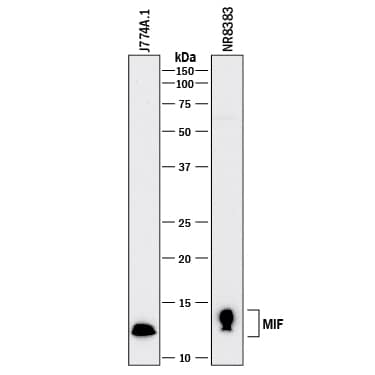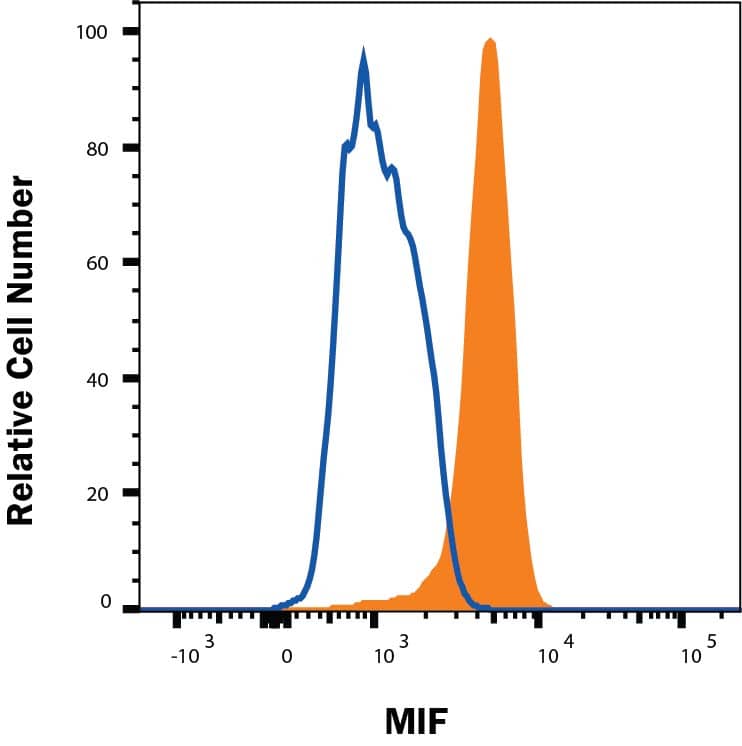Human/Mouse/Rat MIF Antibody
R&D Systems, part of Bio-Techne | Catalog # AF-289-PB


Key Product Details
Species Reactivity
Validated:
Human, Mouse, Rat
Cited:
Human, Mouse, Porcine
Applications
Validated:
CyTOF-ready, Intracellular Staining by Flow Cytometry, Simple Western, Western Blot
Cited:
Affinity Assay, ELISA Development, Flow Cytometry, Immunocytochemistry, Immunohistochemistry-Paraffin, Neutralization, Western Blot
Label
Unconjugated
Antibody Source
Polyclonal Goat IgG
Product Specifications
Immunogen
E. coli-derived recombinant human MIF
Pro2-Ala115
Accession # AAA36315
Pro2-Ala115
Accession # AAA36315
Specificity
Detects human, mouse, and rat MIF in Western blots.
Clonality
Polyclonal
Host
Goat
Isotype
IgG
Scientific Data Images for Human/Mouse/Rat MIF Antibody
Detection of Human MIF by Western Blot.
Western blot shows lysates of THP-1 human acute monocytic leukemia cell line and U937 human histiocytic lymphoma cell line. PVDF membrane was probed with 0.5 µg/mL of Goat Anti-Human/Mouse/Rat MIF Antigen Affinity-purified Polyclonal Antibody (Catalog # AF-289-PB) followed by HRP-conjugated Anti-Goat IgG Secondary Antibody (HAF017). A specific band was detected for MIF at approximately 12 kDa (as indicated). This experiment was conducted under reducing conditions and using Immunoblot Buffer Group 1.Detection of Mouse and Rat MIF by Western Blot.
Western blot shows lysates of J774A.1 mouse reticulum cell sarcoma macrophage cell line and NR8383 rat alveolar macrophage cell line. PVDF membrane was probed with 0.5 µg/mL of Goat Anti-Human/Mouse/Rat MIF Antigen Affinity-purified Polyclonal Antibody (Catalog # AF-289-PB) followed by HRP-conjugated Anti-Goat IgG Secondary Antibody (HAF017). A specific band was detected for MIF at approximately 12-14 kDa (as indicated). This experiment was conducted under reducing conditions and using Immunoblot Buffer Group 1.Detection of Human MIF by Simple WesternTM.
Simple Western lane view shows lysates of THP-1 human acute monocytic leukemia cell line, loaded at 0.2 mg/mL. A specific band was detected for MIF at approximately 12 kDa (as indicated) using 10 µg/mL of Goat Anti-Human/Mouse/Rat MIF Antigen Affinity-purified Polyclonal Antibody (Catalog # AF-289-PB) . This experiment was conducted under reducing conditions and using the 12-230 kDa separation system.Applications for Human/Mouse/Rat MIF Antibody
Application
Recommended Usage
CyTOF-ready
Ready to be labeled using established conjugation methods. No BSA or other carrier proteins that could interfere with conjugation.
Intracellular Staining by Flow Cytometry
0.25 µg/106 cells
Sample: THP-1 cells fixed and permeabilized with FlowX FoxP3 Fixation & Permeabilization Buffer Kit (Catalog # FC012).
Sample: THP-1 cells fixed and permeabilized with FlowX FoxP3 Fixation & Permeabilization Buffer Kit (Catalog # FC012).
Simple Western
10 µg/mL
Sample: THP‑1 human acute monocytic leukemia cell line
Sample: THP‑1 human acute monocytic leukemia cell line
Western Blot
0.5 µg/mL
Sample: THP‑1 human acute monocytic leukemia cell line, U937 human histiocytic lymphoma cell line, J774A.1 mouse reticulum cell sarcoma macrophage cell line, and NR8383 rat alveolar macrophage cell line
Sample: THP‑1 human acute monocytic leukemia cell line, U937 human histiocytic lymphoma cell line, J774A.1 mouse reticulum cell sarcoma macrophage cell line, and NR8383 rat alveolar macrophage cell line
Reviewed Applications
Read 2 reviews rated 5 using AF-289-PB in the following applications:
Formulation, Preparation, and Storage
Purification
Antigen Affinity-purified
Reconstitution
Reconstitute at 0.2 mg/mL in sterile PBS. For liquid material, refer to CoA for concentration.
Formulation
Lyophilized from a 0.2 μm filtered solution in PBS with Trehalose. *Small pack size (SP) is supplied either lyophilized or as a 0.2 µm filtered solution in PBS.
Shipping
Lyophilized product is shipped at ambient temperature. Liquid small pack size (-SP) is shipped with polar packs. Upon receipt, store immediately at the temperature recommended below.
Stability & Storage
Use a manual defrost freezer and avoid repeated freeze-thaw cycles.
- 12 months from date of receipt, -20 to -70 °C as supplied.
- 1 month, 2 to 8 °C under sterile conditions after reconstitution.
- 6 months, -20 to -70 °C under sterile conditions after reconstitution.
Background: MIF
References
- Norand, E.F. and M. Leech (2005) Front. Biosci. 10:12.
- Donn, R.P. and D.W. Ray (2004) J. Endocrinol. 182:1.
- Calandra, T. and T. Roger (2003) Nat. Rev. Immunol. 3:791.
- Kozak, C.A. et al. (1995) Genomics 27:405.
- Weiser, W.Y. et al. (1989) Proc. Natl. Acad. Sci. USA 86:7522.
- Paralkar, V. and G. Wistow (1994) Genomics 19:48.
- Wistow, G.J. et al. (1993) Proc. Natl. Acad. Sci. USA 90:1272.
- Flieger, O. et al. (2003) FEBS Lett. 551:78.
- Philo, J.S. et al. (2004) Biophys. Chem. 108:77.
- Sun, H-W. et al. (1996) Protein Eng. 9:631.
- Stamps, S.L. et. al. (2000) Biochemistry 39:9671.
- Nguyen, M.T. et al. (2003) J. Biol. Chem. 278:33654.
- Sato, A. et al. (2003) Dev. Comp. Immunol. 27:401.
- Bernhagen, J. et al. (1994) Biochemistry 33:14144.
- Leng, L. et al. (2003) J. Exp. Med. 197:1467.
- Meyer-Siegler, K.L. and P.L. Vera (2005) J. Urol. 173:615.
Long Name
Macrophage Migration Inhibitory Factor
Alternate Names
EC 5.3.2.1, EC 5.3.3.12, GIFmacrophage migration inhibitory factor, GLIF, Glycosylation-inhibiting factor, L-dopachrome isomerase, L-dopachrome tautomerase, macrophage migration inhibitory factor (glycosylation-inhibiting factor), MMIF, Phenylpyruvate tautomerase
Gene Symbol
MIF
UniProt
Additional MIF Products
Product Documents for Human/Mouse/Rat MIF Antibody
Product Specific Notices for Human/Mouse/Rat MIF Antibody
For research use only
